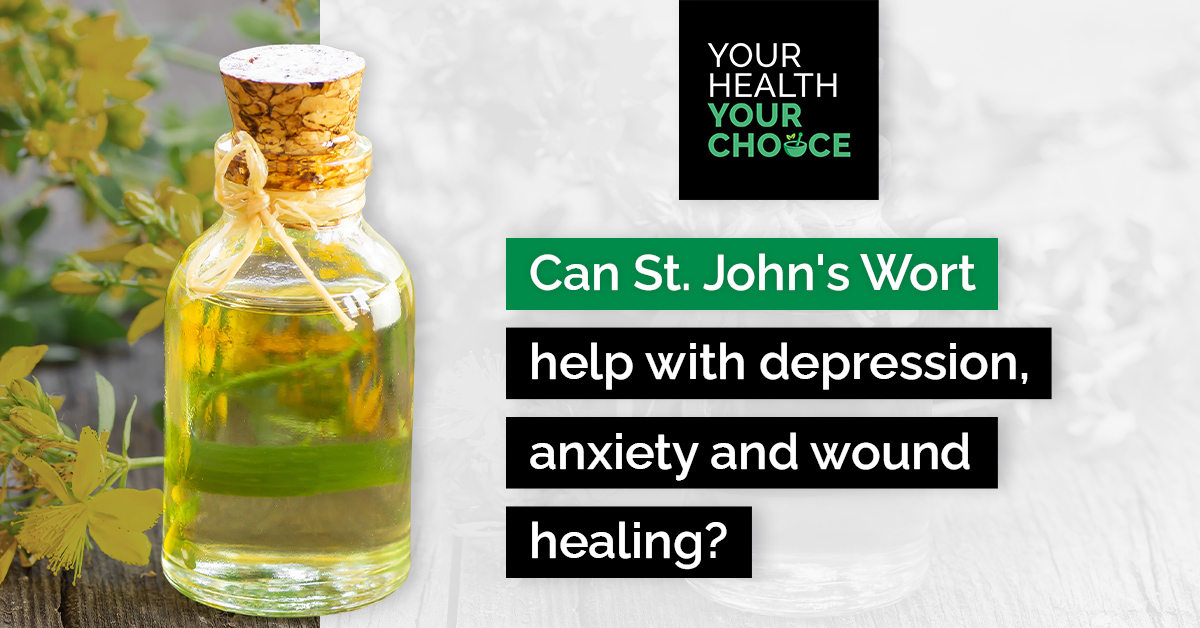St John’s Wort – wound healer

Hypericum perforatum, also known as St. John’s wort, is a perennial herb native to Europe, West Asia, and North Africa. It is naturalised in many parts of the world, in particular North America and Australia.
The plant has been used since antiquity in traditional medicine to treat a wide range of ailments, including depression, anxiety and for wound healing. It was an essential wound wort used by the Crusaders, who used the plant’s red oil to treat wounds.
Folklore: a protector against unwanted influences
In legend, St. John’s Wort was said to bloom on the feast day of St. John the Baptist, which is why it bears his name.
The name ‘hypericum’ derives from the Greek eikon (a figure, possibly an undesired phantasm) and hyper (above). This relates St. John’s wort’s ancient reputation for having protective properties and its use to ward off evil spirits and negative energy. Thus, it was placed over religious icons as a symbol of protection.
The protective reputation of St John’s wort is expressed in the following Old English poem:
‘St. John’s wort doth charm all the witches away.
If gathered at midnight on the saint’s holy day.
And devils and witches have no power to harm
Those that do gather the plant for a charm:
Rub the lintels and post with that red juicy flower
No thunder nor tempest will then have the power
To hurt or to hinder your houses: and bind
Round your neck a charm of a similar kind.’
In medieval Europe, St John’s wort was also thought to have the power to protect against the plague. It was used as a charm to protect against lightning strikes and other natural disasters.
Neurological effects:
The active compounds in St. John’s wort are considered to be hypericin and hyperforin. These compounds are thought to work by increasing the levels of certain neurotransmitters, such as serotonin, dopamine, and noradrenaline, in the brain.
This, in turn, may help to improve mood and reduce symptoms of depression and anxiety.
One of the most well-known uses of St. John’s wort is as a treatment for mild to moderate depression. Several clinical studies have found that the herb is as effective as some prescription antidepressants in treating mild to moderate depression and with fewer side effects. It is important to note that it should not be used as a substitute for professional treatment for severe depression, or for other mental health conditions such as bipolar disorder or severe anxiety disorders.
St. John’s wort may also be used to treat symptoms of anxiety, such as nervousness, restlessness, and insomnia. It has been found to be effective in reducing symptoms of anxiety in several clinical studies and may be a useful alternative treatment for those who do not wish to take prescription medications.
In addition to its uses in treating mental health conditions, St. John’s wort has also been used to treat a wide range of physical ailments. The plant has been found to have anti-inflammatory and antioxidant properties and may be useful in treating conditions such as wound healing, eczema, and fibromyalgia.
Trauma herb:
As a first aid remedy St John’s Wort is specific for injuries to nerve-sensitive areas of the body, such as the fingers, toes, tip of the nose and coccyx. A great way of using St John’s Wort for injury to these parts (such as after dropping something heavy on your toes or a crush injury to a finger) is as an infused oil, applied topically. It not only soothes the pain, but also assists the damaged tissue to heal.
In fact, St John’s Wort is specific for injury to the nervous system in general. This includes nerve trauma that persists long after a traumatic event took place. A common scenario is post-trauma syndrome following accidents, especially after car accidents.
Often, these are life-changing events that a person psychologically struggles to integrate. The type of anxiety and depression that St John’s wort is most suited to helping is often associated with such traumatic life events that ‘open up a hole’ in a person’s life, that take time to come to integrate and heal.
Post-surgery recovery & ill effects of anaesthesia:
An example of the type of painful injury calling for St John’s Wort is falling off a horse onto one’s coccyx. St John’s wort is in fact toxic to horses and interestingly, the plant’s affinity for horses is enshrined in European folklore.
It was believed that ‘faery horses’ used St. John’s wort as a daytime disguise and that stepping on the plant after sunset caused the horse to rear up and carry the unsuspecting person away into the night. At dawn, they would be left far from home holding a sprig in their hand.
This myth alludes to another specific medicinal use for St John’s wort, which is to help people recover from the ill effects of anaesthesia after a surgical procedure. Surgery, like an accident, involves trauma to the body and anaesthesia makes the procedure possible by disassociating the person from the pain. St John’s wort helps the nervous system recover so that the person is not ‘left far from home’ once they wake from the anaesthesia.
Postoperative cognitive dysfunction (POCD) is a common complication post-surgery as a consequence of anaesthesia and is common in the elderly and patients with preexisting neurocognitive disorders. St John’ wort can help to mitigate, even heal this condition.
Pain of shingles:
St John’s Wort as an infused oil, applied topically, is also a specific for assisting the pain of shingles. The herb not only has an anti-viral action, but it also has a particular affinity for the herpes zoster virus and the associated nerve pain.
The oil can also be gently massaged into the area four to five times a day or as desired. As an internal medicine, St John’s wort can be used on its own or combined with other antiviral herbs such as Lemon balm (Melissa officinalis).
Immune-enhancing properties:
The use of St. John’s wort may also have some benefits for people with certain medical conditions, such as HIV and cancer. The hypericin in St John’s wort has antiviral activity against a number of enveloped viruses (viruses that have an outer wrapping or envelope), such as HIV.
It has been found to reduce symptoms associated with these conditions, such as fatigue and nausea, and may also help to boost the immune system.
Precautions:
Hypericum perforatum is not recommended for use in patients with severe depression or other serious mental health conditions. It is also not recommended for use during pregnancy or while breastfeeding.
If you are considering using Hypericum perforatum as a treatment for depression or any other condition, it is important to do this under the guidance of a trained healthcare provider (either a herbalist, naturopath or integrative medical practitioner) first.
« Return to News & Features
